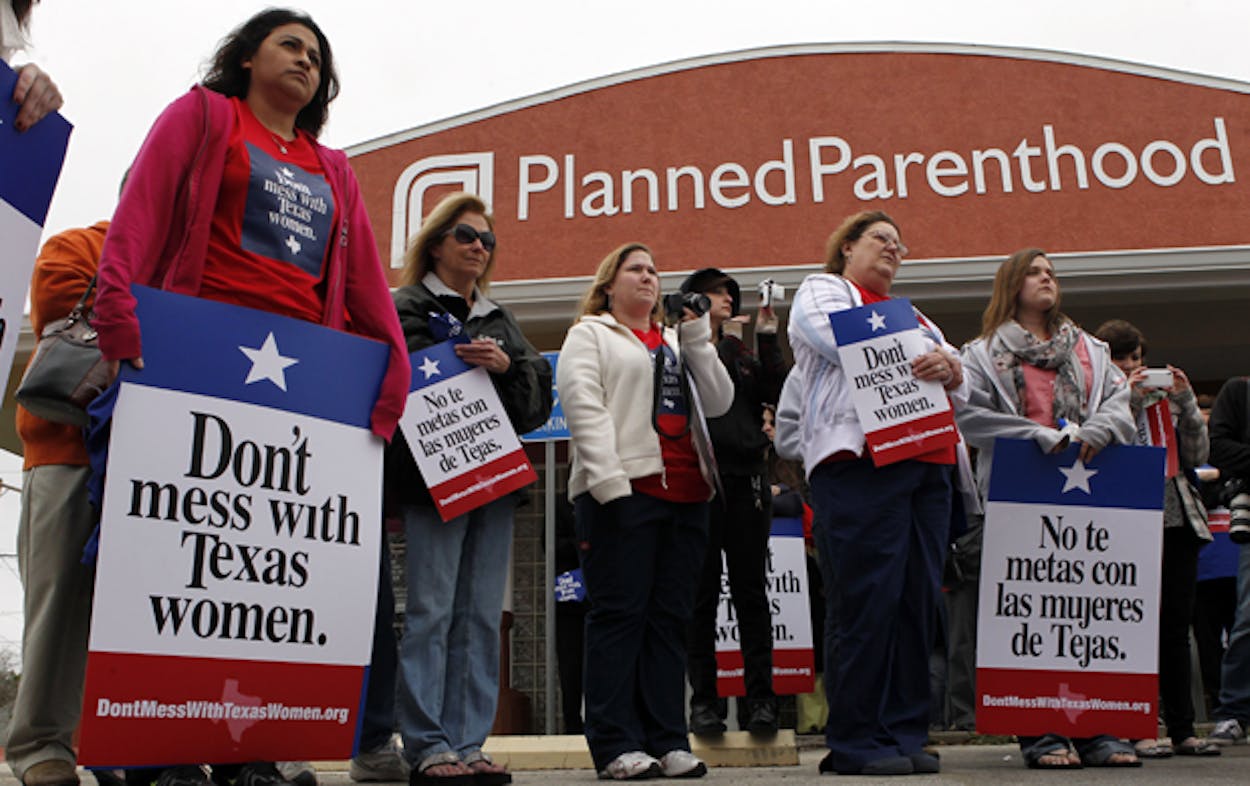Planned Parenthood has suffered a couple of extreme ups and downs this week, and it’s only Wednesday. On Monday, U.S. District Judge Lee Yeakel granted a temporary injunction barring Texas’s Women’s Health Program from excluding facilities like Planned Parenthood, but that injunction was short lived. Attorney General Greg Abbott quickly requested an emergency stay, which was granted by Judge Jerry Smith of the U.S. Court of Appeals for the Fifth Circuit on Tuesday.
On Tuesday night, Planned Parenthood’s lawyers filed a brief asking Judge Smith to reverse his decision. His ruling is expected in 48 hours, according to the Texas Tribune‘s Thanh Tan.
What does being excluded from the program mean for Planned Parenthood and its 49 health centers across Texas? The clinics, none of which perform abortions, “can no longer bill the state for program services,” Texas Health and Human Services Commission spokeswoman Stephanie Goodman told the Houston Chronicle‘s Peggy Fikac and Todd Ackerman. Planned Parenthood has pledged, however, to continue providing services to low-income clients.
Planned Parenthood argues that the Texas law that bars money from going to entities that “affiliate with entities that perform or promote elective abortions” is unconstitutional. In his 24-page opinion (PDF) granting the injunction, Yeakel wrote that it is likely that Planned Parenthood’s First Amendment argument would succeed on the merits.
Yeakel also noted that thousands of low-income women would lose access to family-planning services if Planned Parenthood is excluded from the Women’s Health Program.
The record demonstrates that Plaintiffs currently provide a critical component of Texas’s family-planning services to low-income women. The court is unconvinced that Texas will be able to find substitute providers for these women in the immediate future, despite its stated intention to do so. … Accordingly, the court finds that the public interest is best served by allowing Plaintiffs to continue to receive government funds to provide family-planning services to women throughout Texas while this case is pending.
At Think Progress, Ian Millhiser noted that Smith’s emergency stay (PDF) was a mere two sentences long:
IT IS ORDERED that appellant’s motion for stay pending appeal is GRANTED pending further order of this court. This order is entered by a single judge pursuant to FED. R. APP. P. 8(a)(2)(D).
Millhiser continued that typically, a three-judge panel would issue such a stay.
It is true, as Judge Smith notes, that the Federal Rules of Appellate Procedure permit a single judge to stay a lower court’s decision, but that rule only permits the judge to do so in “an exceptional case in which time requirements make that procedure impracticable.” It’s not at all clear what kind of exceptional time constraints justified allowing Judge Smith to act alone here rather than first consulting with two of his colleagues before issuing this unusual order.
More importantly, it’s unlikely that Smith gave his order much thought at all before handing it down. Judge Yeakel handed down his order weeks after this case was filed, and he produced a 24 page explanation of why it was justified. Smith spent, at most, a few hours — and he offered no explanation whatsoever.
The injunction and speedy reversal prompted Dallas Observer‘s Anna Merlan to quip “When we said yesterday Planned Parenthood could remain part of the Texas’s Medicaid Women’s Health Program ‘for now,’ we didn’t know ‘now’ would last less than 24 hours.”
At Hay Ladies!, Andrea Grimes notes that Smith was part of the panel that lifted U.S. District Judge Sam Spark’s stay on the sonogram law as that litigation proceeded:
If you feel like you’ve heard the song “Fifth Circuit Court Of Appeals Says We Should Totally Keep Enforcing This Potentially Unconstitutional Law While It’s Being Challenged In Court” before, you have: Smith is also on the three-judge panel that has stymied any appeals to Texas’ forced transvaginal ultrasound law.
The date which Planned Parenthood’s lawsuit will get a full hearing in the Western District of Texas will be set at a scheduling conference on May 18. For more background on the tussle over the Women’s Health Program, read this, this, and this.
- More About:
- Politics & Policy
- Health
- Planned Parenthood
- Abortion







